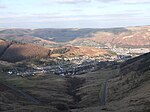Dowlais (High Street) railway station
1885 establishments in Wales1962 disestablishments in WalesDisused railway stations in Merthyr Tydfil County BoroughFormer London and North Western Railway stationsPages with no open date in Infobox station ... and 4 more
Railway stations in Great Britain closed in 1958Railway stations in Great Britain opened in 1885Use British English from May 2021Wales railway station stubs
Dowlais High Street railway station was a station that served the village of Dowlais, Merthyr Tydfil, Wales on the Merthyr, Tredegar and Abergavenny Railway. The station closed in 1962 The site is now occupied by Station Terrace with only the steps visible. .
Excerpt from the Wikipedia article Dowlais (High Street) railway station (License: CC BY-SA 3.0, Authors).Dowlais (High Street) railway station
Station Terrace,
Geographical coordinates (GPS) Address Nearby Places Show on map
Geographical coordinates (GPS)
| Latitude | Longitude |
|---|---|
| N 51.763514 ° | E -3.343294 ° |
Address
Station Terrace
Station Terrace
CF48 3PU , Dowlais Top
Wales, United Kingdom
Open on Google Maps





